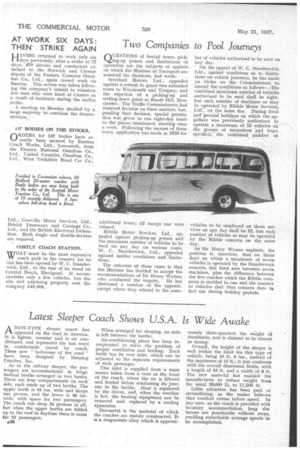Two Companies to Pool Journeys
Page 70

If you've noticed an error in this article please click here to report it so we can fix it.
QiESTIONS of fantail tours, picking-up points and limitations of operation are the subjects of appeals on which the Minister of Transport announced his decisions, last week.
Stretford Motors, Ltd., appealed against a refusal to grant two extended tours to Weymouth and Torquay, and the rejection of a picking-up and setting-down point at Knott Hill, Manchester. The Traffic Commissioners had reserved decision on these matters, but; pending that decision, special permis7 sion was given to run eight-day tours to the places mentioned, starting once a week. Following the success of these tours, application was made in 1930 for
additional tours ; all except one were ref used. • Ribble Motor Services, Ltd., appealed against picking-up points and the maximum number of vehicles to be used on any day on various tours. W. C. Standerwick, Ltd., appealed against similar conditions and limitations.
The outcome of these cases is that the Minister has decided to accept the recommendations of Sir Henry Wynne, who conducted the inquiry. He has dismissed a number of the appeals, except where they related to the num
her of vehicles authorized to be used on any day.
On the appeal of W. C. Standerwick, Ltd., against conditions as to limitations on vehicle journeys, he has made an Order on the Commissioners to amend the conditions as follows :—The combined maximum number of vehicles authorized to be used shall be eight, less such number of machines as may be operated by Ribble Motor Services, _Ltd:, on the same day. During local and general holidays on which the appellant was preViciusly authorized to operate, a maximum Of 12 vehicles on the groups of excursions and tours specified, the combined number of
vehicles to be employed on those services on any day shall be 12, less such number of vehicles as may be operated by the Ribble concern on the same day.
As Sir Henry Wynne explains, the position is, therefore, that on those days on which a maximum of seven vehicles is operated by the Standerwick concern, this limit now becomes seven machines, plus the difference between the five coaches which the Ribble company is entitled to run and the number of vehicles • that that concern does in fact use during holiday periods.




































































































